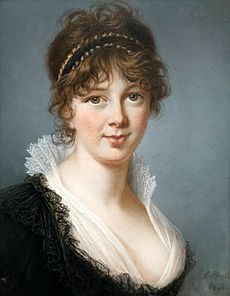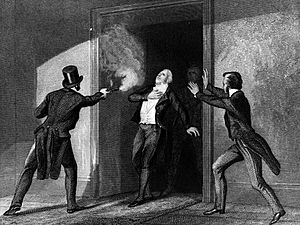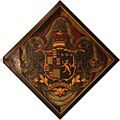Spencer Perceval facts for kids
Quick facts for kids
Spencer Perceval
|
|
|---|---|
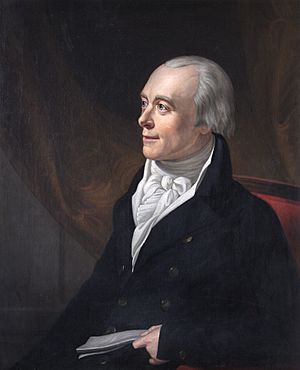
Posthumous portrait by G. F. Joseph, 1812
|
|
| Prime Minister of the United Kingdom | |
| In office 4 October 1809 – 11 May 1812 |
|
| Monarch | George III |
| Regent | George, Prince Regent (1811–12) |
| Preceded by | The Duke of Portland |
| Succeeded by | The Earl of Liverpool |
| Chancellor of the Exchequer | |
| In office 26 March 1807 – 11 May 1812 |
|
| Prime Minister |
|
| Preceded by | Lord Henry Petty |
| Succeeded by | Nicholas Vansittart |
| Leader of the House of Commons | |
| In office April 1807 – 11 May 1812 |
|
| Prime Minister |
|
| Preceded by | The Viscount Howick |
| Succeeded by | The Viscount Castlereagh |
| Chancellor of the Duchy of Lancaster | |
| In office 30 March 1807 – 11 May 1812 |
|
| Prime Minister |
|
| Preceded by | The Earl of Derby |
| Succeeded by | The Earl of Buckinghamshire |
| Attorney General for England and Wales | |
| In office 15 April 1802 – 12 February 1806 |
|
| Prime Minister | |
| Preceded by | Sir Edward Law |
| Succeeded by | Arthur Piggott |
| Solicitor General for England and Wales | |
| In office 1801–1802 |
|
| Prime Minister | Henry Addington |
| Preceded by | Sir William Grant |
| Succeeded by | Thomas Manners-Sutton |
| Member of Parliament for Northampton |
|
| In office 9 May 1796 – 11 May 1812 |
|
| Preceded by | Charles Compton |
| Succeeded by | Spencer Compton |
| Personal details | |
| Born | 1 November 1762 Mayfair, Middlesex, England |
| Died | 11 May 1812 (aged 49) Westminster, Middlesex, England |
| Cause of death | Assassination |
| Resting place | St Luke's Church, Charlton |
| Political party | Tory |
| Spouse |
Jane Wilson
(m. 1790) |
| Children | 13, including Spencer and John Thomas |
| Parent |
|
| Alma mater | Trinity College, Cambridge |
| Signature | |
Spencer Perceval (1 November 1762 – 11 May 1812) was a British politician and lawyer. He served as Prime Minister of the United Kingdom from October 1809 until he was killed in May 1812. Perceval is the only British prime minister to have been assassinated. He was also the only Solicitor General or Attorney General to become prime minister.
Spencer Perceval was the younger son of an Irish earl. He went to Harrow School and Trinity College, Cambridge. He studied law and became a barrister. In 1796, he became a King's Counsel. At 33, he entered politics as a Member of Parliament (MP) for Northampton.
Perceval was a supporter of William Pitt the Younger. He was against giving more rights to Catholics and changing Parliament. He strongly supported the war against Napoleon and wanted to end the Atlantic slave trade. He also disliked hunting and gambling. He was known for being generous and loved spending time with his thirteen children.
He quickly rose in politics. He became Solicitor General, then Attorney General. Later, he was made Chancellor of the Exchequer and Leader of the House of Commons. In 1809, he became prime minister. His government faced many challenges. These included a military disaster, the illness of King George III, and economic problems. He also dealt with Luddite riots.
Perceval successfully handled these problems. He continued the Peninsular War and gained the support of the Prince Regent. By early 1812, his position was stronger. However, he was assassinated in the lobby of the House of Commons. The killer was a merchant named John Bellingham, who had a complaint against the government.
Contents
Early Life and School
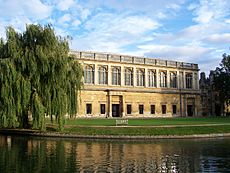
Spencer Perceval was born in London in 1762. He was the seventh son of the 2nd Earl of Egmont. His mother, Catherine Compton, was from a famous family. Her great uncle, Spencer Compton, 1st Earl of Wilmington, had also been a prime minister.
His father worked as a political advisor to King George III. He was also briefly in the Cabinet. Spencer spent his early childhood at Charlton House in London. His father died when Spencer was eight years old.
Perceval attended Harrow School. He was a very disciplined and hardworking student there. At Harrow, he became interested in his Christian faith. He also became lifelong friends with Dudley Ryder. After five years, he went to Trinity College at Cambridge. He won a prize for public speaking and finished his studies in 1782.
Law Career and Family Life
As a younger son, Spencer Perceval had to earn his own living. He chose to become a lawyer. He studied at Lincoln's Inn and became a barrister in 1786. His mother passed away in 1783.
Spencer and his brother Charles rented a house in Charlton. There, they met two sisters, Margaretta and Jane Wilson. Charles married Margaretta. Spencer wanted to marry Jane, but her father, Sir Thomas Spencer Wilson, said no. Spencer was a young lawyer with little money. Sir Thomas wanted him to wait until Jane was 21.
When Jane turned 21 in 1790, Spencer's career was still not going well. Sir Thomas still did not approve of the marriage. So, Spencer and Jane ran away and got married secretly. They lived in a small apartment above a shop. Later, they moved to Lindsey House. They had thirteen children together.
Perceval's family connections helped him get some jobs. He became a commissioner for bankruptcies in 1790. He also got a job at the mint in 1791, which paid him £119 a year. In 1794, he became a lawyer for the Board of Admiralty. He worked on important legal cases for the government. He also joined a volunteer military group in 1794 to help defend against a possible French invasion.
Perceval wrote articles supporting the government and public order. These writings caught the attention of William Pitt the Younger. In 1795, Pitt offered him a job as Chief Secretary for Ireland. Perceval turned it down because he could earn more money as a lawyer. He needed the money for his growing family. In 1796, he became a King's Counsel. This meant he was a senior lawyer. He was only 33, making him one of the youngest ever.
Early Political Career: 1796–1801
In 1796, Perceval's uncle died. His cousin, who was the MP for Northampton, moved to the House of Lords. Perceval was asked to take his place. He was elected without opposition in May. Weeks later, he had to fight for his seat in a general election. Northampton had about a thousand voters. Perceval won and represented Northampton for 16 years until his death. He is the only MP for Northampton to become prime minister.
When Perceval joined the House of Commons in September 1796, his political ideas were already clear. He supported the British system and Pitt. He was against Fox and France. He gave several speeches, always using notes. He continued his law practice because MPs did not get a salary.
In January 1798, Perceval became known as a strong debater. He gave a speech supporting a bill to increase taxes to pay for the war against France. He also criticized Charles Fox. Pitt said it was one of the best speeches he had ever heard. Later that year, Perceval was given a job as Solicitor to the Ordnance.
Solicitor and Attorney General: 1801–1806
Pitt resigned in 1801 because the King did not agree with his plan for Catholic rights. Perceval agreed with the King, so he did not leave with Pitt. His career continued to do well. He became Solicitor General in 1801 and Attorney General in 1802. He stayed in this role when Pitt formed his second government in 1804.
As Attorney General, Perceval worked on cases against radicals. But he also made some fairer decisions about trade unions. He also helped improve conditions for prisoners sent to New South Wales.
When Pitt died in January 1806, Perceval was very sad. Even though he did not have much money, he gave £1,000 to help pay off Pitt's debts. He resigned as Attorney General. He refused to work in the new government led by Lord Grenville, because it included Fox. Instead, he became the leader of the opposition in the House of Commons.
During this time, Perceval used his legal skills to defend Princess Caroline. She was the wife of the Prince of Wales. The Prince wanted a divorce and accused her of having an illegitimate child. Perceval became her advisor. He wrote a long letter to King George III defending her. This letter was known as The Book. When the King refused to let Caroline return to court, Perceval threatened to publish The Book. But Grenville's government fell before he could.
When Perceval joined the new government, he helped clear Caroline of all charges. He also recommended she return to court. He burned most copies of The Book at his home.
Chancellor of the Exchequer: 1807–1809
After Grenville resigned, the Duke of Portland formed a new government. He asked Perceval to become Chancellor of the Exchequer (in charge of the country's money) and Leader of the House of Commons. Perceval would have preferred a different job. He said he didn't know much about money matters. But he agreed to take the position.
Perceval's youngest child was born soon after he became Chancellor. His wife, Jane, became ill. The family moved from their old house to a new country house in Ealing called Elm Grove. Perceval bought it in 1808. In London, Perceval moved into 10 Downing Street.
One of Perceval's first tasks was to expand the Orders in Council. These rules were designed to stop other countries from trading with France. This was in response to Napoleon's ban on British trade. He also made sure that Wilberforce's bill to end the slave trade passed. Perceval was a founding member of the African Institute. This group was set up to protect the new law against the slave trade.
As Chancellor, Perceval had to find money for the war against Napoleon. He did this in 1808 and 1809 without raising taxes. He managed to get loans and save money. As Leader of the House of Commons, he faced a strong opposition. They questioned the government about the war, Catholic rights, and corruption.
Perceval successfully defended the army's commander-in-chief, the Duke of York. The Duke was accused of corruption. Although Parliament found him not guilty of the main charge, he resigned. Perceval advised him to do so.
The Duke of Portland's government was not strong, and his health was failing. In 1809, there was a political crisis. The Duke resigned. The King asked Perceval to become the new prime minister.
Perceval accepted the role on 4 October 1809. He had trouble forming his Cabinet. Two important politicians, Castlereagh and Canning, had fought a duel. Perceval had to serve as his own Chancellor of the Exchequer. He refused to take the extra salary for this role.
Prime Minister: 1809–1812
Many people thought Perceval's new government would not last long. It was especially weak in the House of Commons. In January 1810, the government lost several votes. One was about an inquiry into the Walcheren Expedition. This was a military mission where many soldiers died from disease. The government survived the inquiry, but the expedition's leader resigned.
A radical MP, Sir Francis Burdett, was sent to the Tower of London. He had published a letter criticizing the government. There were riots in the streets supporting Burdett, and some people were killed. As Chancellor, Perceval continued to find money for Wellington's war in Spain and Portugal. He managed to do this with less debt than previous leaders.
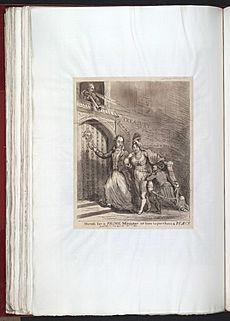
King George III became ill again in 1810. This meant a Regency was likely. The Prince of Wales was expected to become Regent. Perceval was worried because the Prince did not like him. Doctors gave hopeful reports about the King's health. But in December, Perceval decided to introduce a bill for a regency. The bill would limit the Regent's powers for 12 months.
The Prince of Wales and the opposition disliked these limits. But Perceval guided the bill through Parliament. Everyone expected the Regent to change his ministers. But, surprisingly, he kept Perceval. The Regent said he did not want to make his father's illness worse. The Regency Bill became law on 5 February 1811.
The limits on the Regency ended in February 1812. The King was still ill. The Prince Regent decided to keep Perceval and his ministers. The opposition was attacking the Orders in Council. These rules were causing problems with America and were blamed for economic troubles in England. Riots had broken out in the Midlands and North. The government agreed to review the Orders in Council. This review began in early May 1812.
Assassination
On the evening of 11 May 1812, Perceval was going to attend the inquiry into the Orders in Council. As he entered the lobby of the House of Commons, a man stepped forward. The man pulled out a pistol and shot him in the chest. Perceval fell to the floor. He said something like "murder" or "oh my God." These were his last words. He was carried into a nearby room, but he soon died.
At first, people feared it was the start of a rebellion. But it soon became clear that the killer acted alone. The assassin, John Bellingham, was a merchant. He believed the government owed him money and had treated him unfairly. All his requests for help had been rejected.
Perceval's body was taken to 10 Downing Street. An investigation was held the next morning. The verdict was willful murder.
Perceval left behind his wife and twelve children. They ranged in age from three to twenty. He had very little money in the bank when he died. A few days after his death, Parliament voted to give £50,000 to his children. His widow and eldest son also received yearly payments. Jane Perceval remarried in 1815. She died in 1844 at age 74.
Perceval was buried on 16 May 1812 in London. It was a private funeral. The day before, Bellingham was found guilty and sentenced to death. He was executed by hanging on 18 May.
Legacy
Perceval was a small, thin, and very pale man. He usually wore black clothes. He was sometimes called "Little P." He never had a full-sized portrait painted. His images are either small pictures or based on a mask made after his death. Perceval was the last British prime minister to wear a powdered wig and knee-breeches.
He is sometimes called one of Britain's forgotten prime ministers. He is mostly remembered for how he died. He was not seen as an inspiring leader. But he was known as a religious, hardworking, and principled man. He led the country through difficult times. A politician named Henry Grattan described him as a strong ship that could handle any weather.
Many people mourned Perceval. But in some places, like Nottingham, crowds were happy after his death. Public memorials to Perceval were put up in Northampton, Lincoln's Inn, and Westminster Abbey. The memorial in Westminster Abbey shows Perceval lying down. It has figures representing Truth, Temperance, and Power.
Four books have been written about his life. There are also three books about his assassination. His death inspired poems, like Universal sympathy on the martyr'd statesman (1812):
Such was his private, such his public life,
That all who differ'd in polemic strife,
Or varied in opinion with his plan,
Agreed with one accord to love the man.
In July 2014, a memorial plaque was put up in the Houses of Parliament. It is near where he was killed. Streets in Northampton and London are named Spencer and Percival Streets in his memory.
Family Life
Spencer and Jane Perceval had thirteen children. Twelve of them lived to adulthood. Four of their daughters never married. They lived together all their lives. After their mother died, they moved to Pitzhanger Manor House.
- Jane (1791–1824) married her cousin Edward Perceval in 1821. She died three years later.
- Frances (1792–1877) lived with her three unmarried sisters.
- Maria (1794–1877) lived with her three unmarried sisters.
- Spencer (1795–1859) went to Harrow and Trinity College, Cambridge, like his father. After his father's death, he received money and free legal training. He became an MP at 22. In 1821, he married Anna and had eleven children. He joined a church group and became a commissioner for mental health.
- Charles (born and died 1796)
- Frederick James (1797–1861) did not go to Harrow due to his health. He married twice. He was a director of an insurance company and a justice of the peace.
- Rev. Henry (1799–1885) went to Harrow and Oxford. He was the only Perceval to become head of Harrow School. In 1826, he married his cousin Catherine Drummond. He was a rector for 46 years.
- Dudley Montague (1800–1856) went to Harrow and Oxford. He also received free legal training. He worked in South Africa for two years. He married there in 1827. Back in England, he got a government job. He tried to become an MP for Oxford University but lost.
- Isabella (1801–1886) married her cousin Spencer Horatio Walpole in 1835. She was the only daughter to have children. Her husband became an MP and Home Secretary.
- John Thomas (1803–1876) went to Harrow. He was an army officer and went to Oxford. He spent three years in mental asylums. After his release, he campaigned to change mental health laws. He married in 1832.
- Louisa (1804–1891) lived with her three unmarried sisters.
- Frederica (1805–1900) lived with her three unmarried sisters. In her will, she left money to build All Saints Church in Ealing. It is also known as the Spencer Perceval Memorial Church.
- Ernest Augustus (1807–1896) went to Harrow. He served in the army for nine years. In 1830, he married his cousin Beatrice Trevelyan. They settled in Somerset and had a large family. Ernest worked as a private secretary for the Home Office.
Images for kids
-
Hatchment in St Luke's Church, Charlton
-
Marble bust of Spencer Perceval at Pitzhanger Manor
See also
 In Spanish: Spencer Perceval para niños
In Spanish: Spencer Perceval para niños
 | Misty Copeland |
 | Raven Wilkinson |
 | Debra Austin |
 | Aesha Ash |


